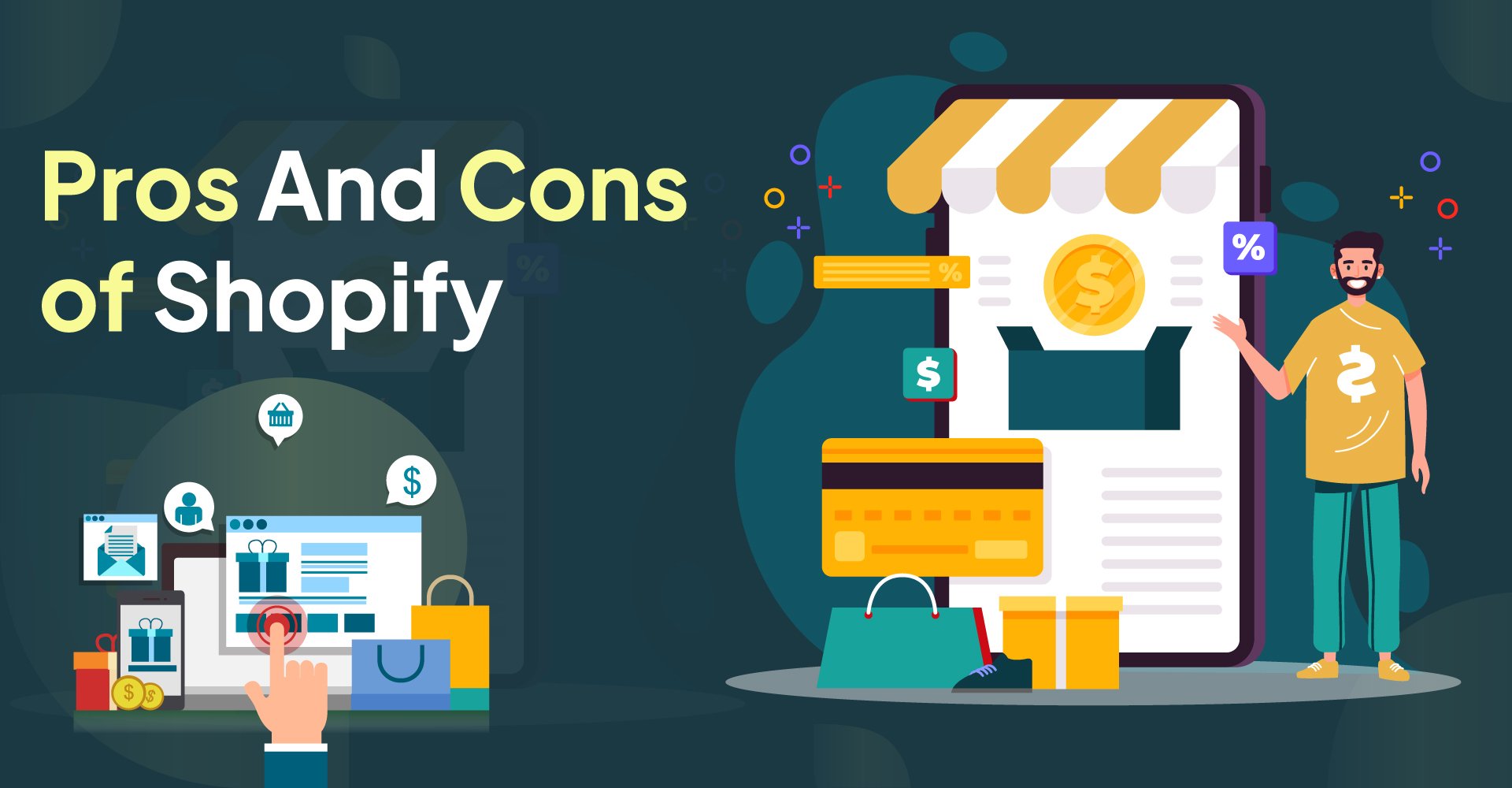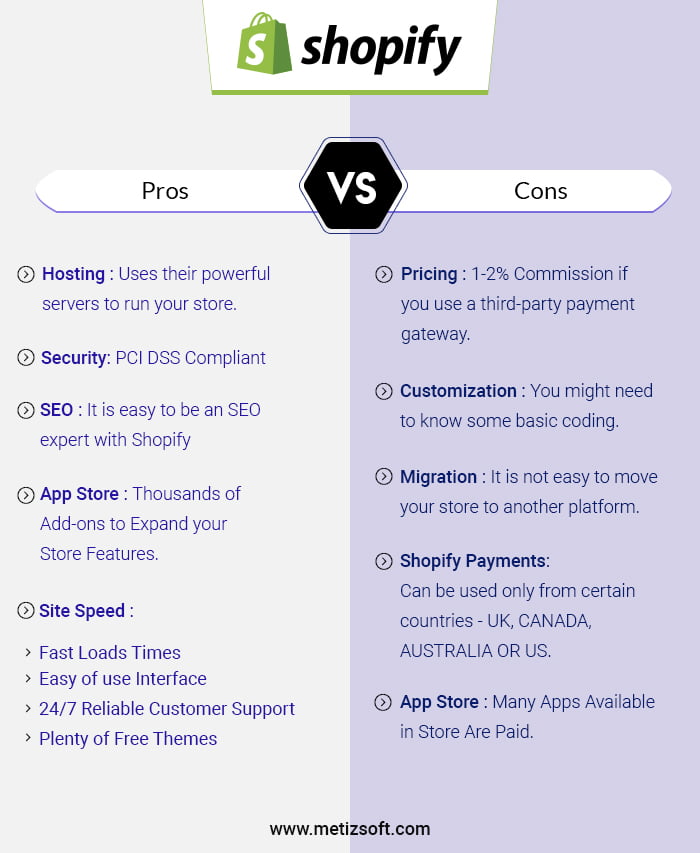Opening a Shopify store can be an exciting venture. It offers many opportunities but also has its downsides.
Starting an online store with Shopify seems appealing for many entrepreneurs. The platform is known for its user-friendly interface and extensive features. But, like any business decision, there are advantages and disadvantages. Understanding these can help you make an informed choice.
Whether you’re a seasoned business owner or a newcomer, weighing the pros and cons is essential. This blog post will provide a balanced overview of what you can expect. From ease of use to potential costs, it will cover crucial aspects. By the end, you’ll have a clearer idea of whether Shopify is the right fit for your online store. Stay tuned to explore the details.
Introduction To Shopify
Shopify is a popular platform for building online stores. It helps businesses sell products online easily. Many choose it for its simplicity and powerful features.
What Is Shopify?
Shopify is an e-commerce platform. It allows you to create an online store without technical knowledge. Founded in 2006, it has grown rapidly. Today, it powers over one million businesses worldwide.
With Shopify, you can customize your store using various templates. It also offers tools for marketing, payment processing, and shipping. This makes it a one-stop solution for online retailers.
Why Choose Shopify?
Many choose Shopify for its ease of use. Setting up a store is quick and straightforward. You do not need coding skills to get started.
Shopify offers a range of features:
- Customizable Templates: Use pre-designed templates to create a unique store.
- Secure Payment Processing: Accept payments through various methods securely.
- Marketing Tools: Access tools for SEO, email marketing, and more.
- 24/7 Support: Get help anytime from Shopify’s support team.
Shopify also integrates with many third-party apps. This allows you to add extra functionality to your store as needed.
Below is a table summarizing some key pros and cons:
| Pros | Cons |
|---|---|
| Easy to use | Monthly fees |
| Secure payment options | Transaction fees |
| Customizable templates | Limited free themes |
| 24/7 support | Costs for advanced features |
In summary, Shopify is a strong choice for online stores. Its ease of use and features make it a top contender.

Credit: www.enzuzo.com
Ease Of Use
One of the significant advantages of opening a Shopify store is its ease of use. Shopify is designed to be accessible, even for those with no technical skills. This platform allows you to set up and manage your online store with minimal effort.
User-friendly Interface
Shopify has a user-friendly interface that simplifies navigation. The dashboard is clear and intuitive. You can easily find what you need. This makes managing your store straightforward. Adding products, managing inventory, and processing orders are all simple tasks.
Setup Process
The setup process on Shopify is quick and easy. You can get your store up and running in minutes. Shopify provides step-by-step guides. These guides help you set up your store without any hassle.
There are various themes to choose from. You can customize these themes to match your brand. Shopify also offers a range of apps. These apps can enhance your store’s functionality.
Customization Options
Opening a Shopify store offers various customization options. These options allow you to create a unique and engaging online store. Let’s explore the customization features Shopify provides.
Themes And Templates
Shopify offers a wide range of themes and templates. These are designed to suit different types of businesses. You can find both free and paid themes in the Shopify Theme Store. The themes are easy to customize, even for beginners. You can change colors, fonts, and layouts without coding skills. This flexibility ensures your store looks professional and aligns with your brand.
App Integrations
Another great feature is the variety of app integrations available. Shopify’s App Store has numerous apps to enhance your store’s functionality. You can add apps for marketing, sales, customer support, and more. These apps help you tailor your store to meet specific needs. Integrating apps is simple and usually involves just a few clicks.
Cost Considerations
Starting a Shopify store involves various costs. Understanding these costs can help you plan better. Knowing the expenses helps you budget effectively. Here, we will cover the key cost aspects.
Subscription Plans
Shopify offers several subscription plans. The Basic plan starts at $29 per month. The Shopify plan costs $79 per month. The Advanced plan is $299 per month. Each plan includes different features. Choose a plan based on your needs. Start with the Basic plan if you are new.
Additional Fees
Besides subscription fees, there are other costs. Transaction fees apply if you use external payment gateways. These fees range from 0.5% to 2%. Using Shopify Payments can avoid these fees. You might also pay for apps and themes. Some apps have monthly fees. Premium themes can cost over $100.
Support And Resources
When starting a Shopify store, having the right support and resources is crucial. They help you navigate challenges and optimize your store’s performance. Shopify provides extensive support and educational materials that can significantly benefit store owners.
Customer Support
Shopify offers 24/7 customer support through various channels. You can contact them via:
- Live chat
- Phone
This round-the-clock support ensures you get help whenever you need it. Shopify’s support team is knowledgeable and responsive. They can assist with technical issues, billing questions, and general inquiries.
For quick answers, Shopify also has an extensive help center with articles and guides. This self-service option is great for finding solutions without waiting for a response.
Educational Materials
Shopify provides a wealth of educational materials to help you learn and grow. These resources include:
- Video tutorials
- Webinars
- Blog posts
- Guides
Video tutorials cover various topics from setting up your store to advanced marketing strategies. Webinars offer live sessions with experts where you can ask questions and get real-time answers.
The Shopify blog is updated regularly with tips and insights. It covers a wide range of topics, including e-commerce trends, marketing techniques, and product ideas. Detailed guides provide step-by-step instructions for specific tasks, making it easier to follow along.
Shopify Academy offers free courses on various aspects of running an online store. These courses cover topics like SEO, social media marketing, and product photography. Taking these courses can help you improve your skills and run your store more effectively.
Scalability
Scalability is crucial for any growing business. Shopify offers many features that can help your store grow smoothly. But, it also has some drawbacks. Let’s look at the pros and cons of scalability when you open a Shopify store.
Growth Potential
Pro: Shopify makes it easy to scale your business. You can start with a small store and add more products as you grow. The platform supports many products and customers. This means your store can handle growth without any issues.
Con: Scaling can lead to higher costs. As your store grows, you may need to upgrade your plan. This can increase your monthly expenses. Some apps also charge more as you add more products or customers. This can add to your overall costs.
Handling Increased Traffic
Pro: Shopify can handle increased traffic well. The platform is built to support many visitors at once. This means your store will stay fast and reliable even during busy times. This is important for keeping your customers happy.
Con: Customization may be limited. If you need specific features or designs, you might need to use apps or hire a developer. This can add to your costs and make managing your store more complex.
In summary, Shopify offers great scalability options. It supports growth and handles traffic well. But, there are costs and limitations to consider. It’s important to weigh these pros and cons before deciding.
Security Features
Security features are a significant consideration for any online store. Shopify offers robust measures to ensure your store and customer data remain safe. Let’s delve into these security features under the headings Data Protection and Fraud Prevention.
Data Protection
Data protection is crucial for any business. Shopify uses advanced encryption methods. This ensures that sensitive data, like customer information, remains secure.
Shopify is PCI DSS Level 1 compliant. This means it adheres to the highest security standards for handling card payments. Regular security updates keep your store protected against new threats.
Shopify also offers SSL certificates for all stores. This encrypts data transferred between your store and your customers. It builds trust and keeps personal information safe.
| Feature | Description |
|---|---|
| Encryption | Uses advanced methods to protect data. |
| PIC DSS Compliance | Adheres to highest security standards for card payments. |
| SSL Certificates | Encrypts data transferred between store and customers. |
Fraud Prevention
Fraud can be a major issue for online stores. Shopify includes several features to help prevent fraudulent transactions.
One key feature is the built-in fraud analysis. This tool flags orders that appear suspicious. It uses various indicators to assess the risk level of each order.
Shopify also offers two-step authentication. This adds an extra layer of security to your account. It requires a second form of verification before access is granted.
Additionally, Shopify allows you to block certain IP addresses. This helps prevent unauthorized access from known trouble areas.
- Fraud analysis – Flags suspicious orders using various indicators.
- Two-step authentication – Adds an extra verification step for account access.
- IP address blocking – Prevents access from known trouble areas.

Credit: adoric.com
Limitations
Running a Shopify store offers many benefits. Still, it also has some limitations. Understanding these limitations helps in making an informed decision. Let’s explore some key drawbacks.
Transaction Fees
Shopify charges transaction fees on each sale, unless you use Shopify Payments. These fees can add up quickly. For businesses with high sales volume, this becomes significant.
Below is a table that outlines the transaction fees for different plans:
| Plan | Transaction Fee |
|---|---|
| Basic Shopify | 2.0% |
| Shopify | 1.0% |
| Advanced Shopify | 0.5% |
These fees can impact your profit margins. It is crucial to consider this before committing.
Platform Restrictions
Shopify has platform restrictions that may limit your store’s flexibility. Customization is limited by the platform’s boundaries. Advanced developers might find this restrictive.
Consider these limitations:
- Limited customization options
- Restrictions on certain types of products
- Less control over server environment
These limitations might not suit businesses that need high customization. For some businesses, flexibility is key, and these restrictions could be a deal-breaker.

Credit: www.metizsoft.com
Frequently Asked Questions
What Are The Benefits Of A Shopify Store?
Shopify offers a user-friendly interface, customizable templates, and integrated payment processing. It also provides excellent customer support and a variety of apps to enhance functionality.
Are There Any Downsides To Using Shopify?
Yes, transaction fees can be high, and customization beyond templates may require coding knowledge. Additionally, monthly subscription costs can add up.
Is Shopify Good For Small Businesses?
Yes, Shopify is ideal for small businesses due to its ease of use, scalability, and comprehensive support. It allows for quick setup and management.
How Secure Is A Shopify Store?
Shopify is highly secure, offering SSL encryption and PCI compliance. It ensures customer data protection and safe transactions.
Conclusion
Opening a Shopify store has its benefits and drawbacks. The platform offers easy setup and many features. Yet, it can be expensive and competitive. Weigh your options carefully. Consider your budget and goals before deciding. A Shopify store can be a great start for many.
But it’s not the only choice. Choose what fits your business best. Happy selling!

